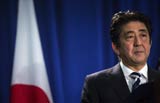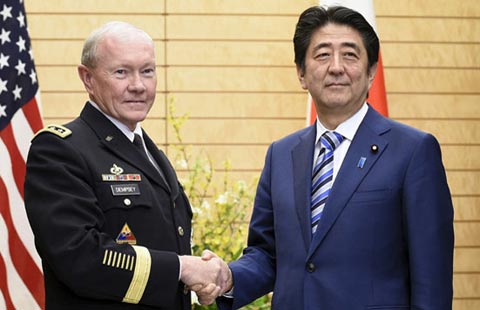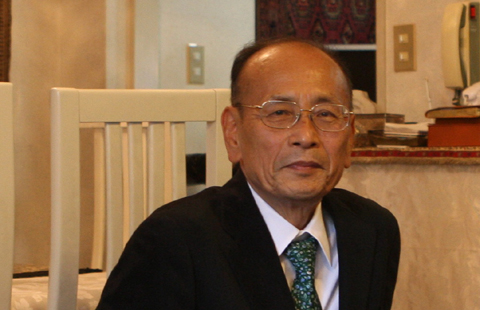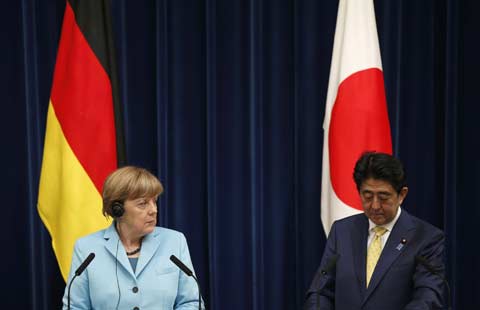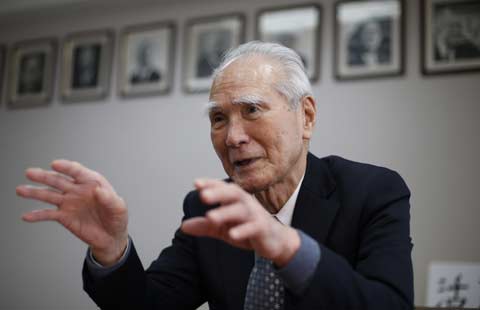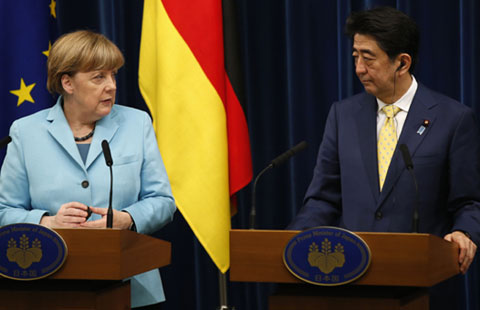Military issues past, present engulf Abe
[2015-04-30 13:39]When Japanese Prime Minister Shinzo Abe stepped into the well of the US Capitol on Wednesday, reminders of his country's World War II-era military aggression were right outside. Abe instead chose to focus on future military matters - an enhanced alliance with the United States.
Abe's US trip: sense or sensibility?
[2015-04-26 16:02]Sensibility is enticing, but when it comes to national and international interests, a wise man always chooses sense over sensibility.
Abe's tepid offering of remorse bad omen for WWII anniversary statement
[2015-04-23 09:54]Japanese Prime Minister Shinzo Abe on Wednesday expressed his "deep remorse" for some of Japan's atrocities during Word War II, but he eschewed referencing key phrases from previous war statements.
Japan's meddling in South China Sea at wrong time, wrong place
[2015-04-17 16:17]Using multilateral platforms like the Group of Seven (G7) to meddle in the situation of the South China Sea, Japan has once again made an unwise move which came at a wrong place and a wrong time.
'Human trafficking' just tip of comfort women issue iceberg
[2015-03-31 11:03]Japanese Prime Minister Shinzo Abe described tens of thousands women forced into sex slavery for Japanese troops during WWII as victims of human trafficking during a recent interview.
Abe should not miss the chance to build bridges
[2015-03-31 08:25]Abe will miss a chance for Japan's reconciliation with other Asian nations if he shuns the ceremonies at the Lugou Bridge.
Commentary: War statement debate a smoke grenade for Abe
[2015-03-26 15:32]The world should be increasingly vigilant to the wily Japanese Prime Minister Shinzo Abe and his moves towards historical revisionism.
Commentary: Absurd conception of history held by Abe's advisers alarming
[2015-03-24 14:46]Some experts tasked to draft the Abe Statement to mark the end of WWII have revealed their absurd conception of history when they expressed doubt whether to use the word "aggression".
Japan needs to seek reconciliation with neighbors: ex-diplomat
[2015-03-16 11:36]Japan needs to seek reconciliation with its neighboring countries through facing up to its wartime past, just like what Germany has done, a Japanese former senior official with the country's foreign ministry said.
World media join Merkel in urging Japan to face history
[2015-03-12 11:23]World media and public have joined German Chancellor Angela Merkel in urging Japan to learn from Germany and squarely face up to its wartime atrocities.
Japan ex-PM says Abe risks alienating neighbours
[2015-03-10 15:14]Prime Minister Shinzo Abe risks further alienating Asian neighbours if he does not stick to the substance of a 1995 apology for wartime aggression, the man who issued the landmark statement two decades ago says.
China Voice: Japan stands at crossroads
[2015-03-10 13:48]As the world prepares to commemorate the 70th anniversary of the end of World War II, Japan finds itself at a crossroads: maintain a pacifist stance or revive militarism?
